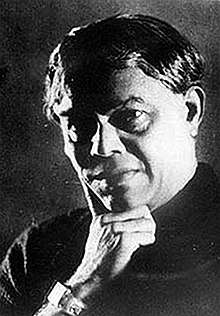T. P. Kailasam
Thyagaraja Paramasiva Iyer Kailasam (Kannada: ತ್ಯಾಗರಾಜ ಪರಮಶಿವ ಐಯ್ಯರ್ ಕೈಲಾಸಂ, 1884–1946), was a playwright and prominent writer of Kannada literature. His contribution to Kannada theatrical comedy earned him the title Prahasana Prapitamaha, "the father of humorous plays" and later he was also called "Kannadakke Obbane Kailasam" meaning "One and Only Kailasam for Kannada".
T.P. Kailasam | |
|---|---|
 | |
| Born | 29 July 1884 Mysore, India |
| Died | 1946 Bangalore, Karnataka, India |
| Occupation | Playwright, Geologist |
| Genre | Fiction, humor, comedy |
| Parents | T Paramasiva Iyer (father) |
Life
Kailasam was born in a Tamil family in southern Karnataka, India. His father, T Paramasiva Iyer, was employed as munsif in the Mysore state service and progressed to become the Chief Justice of the Mysore High Court. His father's brother was the Madras High Court judge, Sir T. Sadasiva Iyer.[1]
Kailasam had a good education and was supported by the Maharaja of Mysore to study geology in Royal College of Science London. Kailasam repeated several classes to have an excuse to extend his stay in England. He spent six years in school there, participating in theatre whenever possible.
Soon after his return, he joined the government geology service. He became disillusioned with a government job and quit to write plays and live a bohemian life. His father's failed ambitious plan that he would become the Director General of the Geology Department led him to stop talking to him.
Playwright
Kailasam's life was dedicated to local theatre and his contributions revolutionised it. His humour left an impression on Kannadigas. He opposed the company theatre's obsession with mythology and stories of royalty and shied away from loading his plays with music. Instead, he introduced simple, realistic sets. Kailasam chaired the Kannada Sahitya Sammelana held at Madras in 1945. He spent almost 10 years in a place he called 'NOOK'. It was a very dirty place, yet he loved it and wrote many dramas in there. He dictated his stories to his students at the 'NOOK', usually starting after 10 pm. He was a chain smoker.
Kailasam was initially criticised for modern use of the Kannada language in his plays, but his work became popular and is considered among the best in Kannada theatre, known for wit and satirical commentary on society.
Plays
Kananda
- ToLLu Gatti or MakkaLiskool Manelalwe? [ಟೊಳ್ಳು ಗಟ್ಟಿ]
- Poli Kitti, The Story of a born scout [ಪೋಲಿ ಕಿಟ್ಟಿ]
- Bahishkara [ಬಹಿಷ್ಕಾರ]
- HomeRoolu [ಹೋ೦ರೂಲು ]
- Gandaskatri [ಗಂಡಸ್ಕತ್ರಿ]
- Vaidyana Vyadhi [ವೈದ್ಯನ ವ್ಯಾಧಿ]
- TaLikattokkooline? [ತಾಳಿಕಟ್ಟೋಕ್ಕೂಲಿನೇ]
- Huttadalli Hutta (Waels Within Weals) [ಹುತ್ತದಲ್ಲಿ ಹುತ್ತ]
- BandvaLvillada Badayi [ಬಂಡ್ವಾಳ್ವಿಲ್ಲದ ಬಡಾಯಿ]
- Ammavra Ganda [ಅಮ್ಮಾವ್ರ ಗಂಡ ]
- Seekarne Saavitri [ಸೀಕರ್ಣೆ ಸಾವಿತ್ರಿ]
- Sattavana Santhaapa [ಸತ್ತವನ ಸಂತಾಪ]
- AnukoolakkobaNNa [ಅನುಕೂಲಕ್ಕೊಬ್ಬಣ್ಣ]
- Namkampni [ನಮ್ ಕಂಪನಿ]
- NamkLabbu [ನಮ್ಕ್ಳಬ್ಬು]
- NammBramhaNkay [ನಮ್ಮ್ ಬ್ರಾಹ್ಮಣ್ಕೆ]
- SooLe (Murder O' Mercy) [ಸೂಳೆ]
English
- Fulfilment
- Purpose
- The Brahmin's Curse
- Simply Kailawesome (film)
References
- Rao, L. S. Seshagiri (984). T.P Kailasam. Sahitya Akademi. pp. 1–8.